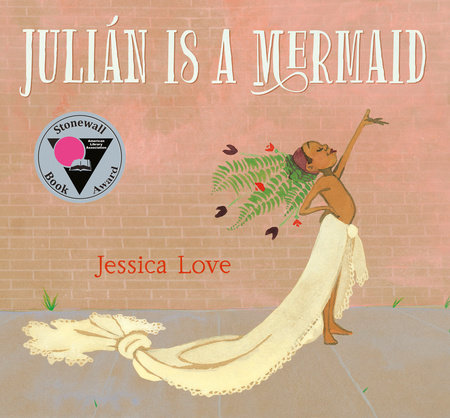Julián Is a Mermaid:
A Heartwarming Lesson in Identity and Unconditional Love
by Jennifer Garry
I gave up on trying to dress my daughters like they frolicked from the pages of a catalog or lifestyle blog when they were very young. Realizing the joy they got from dressing themselves (even if clashing patterns made me cringe or interesting combinations were conversation starters for strangers everywhere), it seemed like a no brainer. Less crying and meltdowns paired with the seeds of a lesson in having control over their bodies? Yes, please.
I have photos of my daughters in princess gowns while shopping at the mall, wearing two different sneakers at preschool, and wearing a fox mask and fancy party dress in the middle of a garden center. They are hilarious, but they are also incredible records of who my kids were at very specific points in time. Giving them the ability to express themselves helped them blossom into who they truly are.
This idea is at the very core of Jessica Love’s Stonewall Book Award-winning picture book, Julián Is a Mermaid. It is an absolutely beautiful celebration of self-expression and unconditional love.
From the very first pages, when three glamorous women dressed in mermaid tails step onto Julián’s subway car, we learn that he LOVES mermaids. After watching them closely, the next pages show him transforming from sitting in his seat reading a book to becoming an exuberant, flowy-haired, pink-tailed mermaid.
The illustrations here and throughout the book are breathtaking. There is flowy, aquatic movement on each page, whether it’s the flip of hair, the swirling path of imaginary fish, or the fluttering of a curtain in the breeze.
Snapping back to reality as they reach their stop, Julián tells his abuela that he, too, is a mermaid. The look on her face leaves readers — and, it seems, Julián — unsure of how she feels about this. She heads to the bath and tells him to be good.
While she’s gone, Julián has a good idea. He strips down to his undies and begins collecting things from around the apartment — fern fronds, flowers, lipstick, and a beautiful, flowy curtain. He uses them to transform himself into a gorgeous, long-haired mermaid, straight from his daydream on the train.
When abuela emerges from the bath wrapped in towels and with knitted brows and pursed lips, it seems she’s not too pleased with Julián’s transformation. Does she not like him as a mermaid? Julián inspects himself with a more critical eye after abuela walks out of the room, the happiness and pride that were so clear on his face have faded, and in their place is uncertainty.
But when abuela returns, she hands Julián a beautiful necklace to complete his look. She takes his hand and whisks him off on a surprise adventure. He walks down the sidewalk looking absolutely regal, his head held high with confidence as he holds his abuela’s arm. She leads him straight to Coney Island’s Mermaid Parade, where men and women dressed just like Julián march around happily together.

Julián is a little shy at first, but abuela delivers what is possibly the most important line in the sparsely-worded story: “Like you, mijo. Let’s join them.”
In that moment, abuela not only let’s Julián know she sees him for who he truly is, but she tells him that he is not alone while showing him a vibrant, shimmering community of people who are unapologetically themselves. While we may have doubted her earlier in the book, abuela delivers the best gift imaginable: unconditional love and community.
This is the gift we should all strive to give our babies: the gift of knowing we love them fully and without question while they show us how they truly see themselves. We don’t get there by joking that you can’t let Dad see his son flitting around in a tutu or by forcing our daughters to wear stiff, itchy dresses when they want to try out a bow tie and suspenders. We get there by giving them the reigns and letting them explore themselves while we sit back and applaud them for it.

